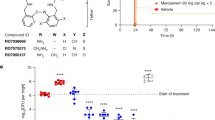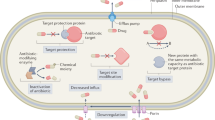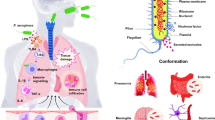Abstract
COMBINED therapy with two or more antibacterial drugs may be useful in the treatment of an individual case, and in discouraging the development of resistance1. A formula was previously presented which could be used in evaluating the combined effect of two drugs2. An organism, highly resistant to penicillin alone and streptomycin alone, is often not affected by a combination of both, when they are combined at their attainable blood levels. In this instance addition of a third antibiotic may yield an inhibitory combination at concentrations of their respective blood levels.
This is a preview of subscription content, access via your institution
Access options
Subscribe to this journal
Receive 51 print issues and online access
$199.00 per year
only $3.90 per issue
Buy this article
- Purchase on Springer Link
- Instant access to full article PDF
Prices may be subject to local taxes which are calculated during checkout
Similar content being viewed by others
References
Smith, D. T., Conant, N. F., and Overman, J. R., Zinsser Microbiology, thirteenth ed., 145 (1964)
Kaplan, D., and Koch, W., Nature, 195, 958 (1962).
Author information
Authors and Affiliations
Rights and permissions
About this article
Cite this article
KAPLAN, D., KOCH, W. Synergism of Three Antimicrobial Drugs. Nature 209, 718–719 (1966). https://doi.org/10.1038/209718a0
Issue Date:
DOI: https://doi.org/10.1038/209718a0
This article is cited by
Comments
By submitting a comment you agree to abide by our Terms and Community Guidelines. If you find something abusive or that does not comply with our terms or guidelines please flag it as inappropriate.



